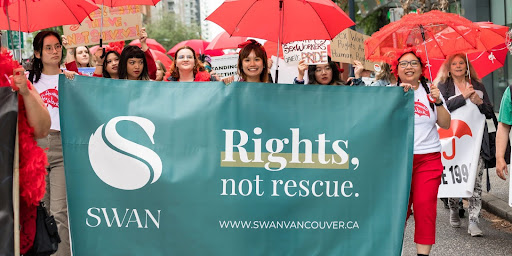A sex worker organization is calling out the way news reports on sex work. Current portrayal of sex-trade workers can expose them to more harm, said the Supporting Women’s Alternatives Network of Vancouver (SWAN Vancouver). Stigmatization of indoor venues may push workers into more dangerous workplaces and shut down the discussion on safety.
“I recognize it’s a difficult time for journalists,” said Crystal Laderas, Communications Manager at SWAN Vancouver. “Last week has been a devastating time for newsrooms. I really sympathize with journalists who have lost their jobs and reporters who have stayed but will probably be asked to do more with fewer resources.”
Laderas said she hopes SWAN’s responsible reporting resources can support journalists in fairly covering stories about sex work. While journalists may be stretched thin, she said she is optimistic about their commitment to fair reporting.
“Many journalists do recognize what’s on the line for immigrants, migrant women and sex workers,” Laderas said.
After hosting a focus group of workers who have opted to stay anonymous, SWAN found that many sex workers were further marginalized and felt humiliated by language used in news stories.
One focus group participant expressed frustration over the use of words like, “brothel” or “dodgy business.”
“These words are already very disrespectful to the people in this industry,” the participant said. “The government is allowing them to work in this industry. They didn’t ban it. Therefore, you shouldn’t use such words and disrespect these women.”
Laderas said this language increases support for crackdowns on venues like massage parlours. However, indoor venues can actually be harm reducing.
READ MORE: Washington’s new Stripper’s Bill of Rights is promising in all the right ways
“When women have to work in a private residence like an apartment or condo, they become the target of violence and robbery,” Laderas said. “It’s different when they’re in a commercial property, out in the open. If there’s some sort of commotion happening, other people can hear about it. You also are able to have more workers in a space like a commercial property. The more women and staff there, the more they can look out for each other.”
Kelly Go, Program Manager at SWAN Vancouver, said attention to language in reporting is very important, especially to avoid conflation between human trafficking and sex work. Go has done outreach at two of the massage parlours in Calgary.
“Conflating sex work and human trafficking is reinforcing this sentiment that’s seeing sex workers as people who cannot make decisions,” Go said.
“We’re seeing a kind of binary,” Go added. “Oftentimes it creates a situation where if sex workers don’t play the victim role, then they get flipped to being a criminal.”
In a workshop about how to better represent sex-workers in the news, educators from SWAN Vancouver pointed to two examples of reports where sex work and human trafficking were conflated.
In an April news release by the Alberta Law Enforcement Response Teams, businesses owned by Hai (Anna) Yan Ye were said to be linked with suspected human trafficking.
Information obtained from the Alberta court checks shows charges laid were all in relation to drug offences, firearm offences and prostitution offences. No human trafficking charges were laid.
Across the country in Durham, ON, a June press release by police said they had concluded an investigation into “drug trafficking and human trafficking.”
The same release says charges laid were in relation to drug trafficking, property crime, violent crime and obtaining sexual services.
Durham Police, however, said it is dangerous to assume no human trafficking has occurred when human trafficking charges aren’t laid.
“Because Durham Regional Police Service recognizes that their approach needs to be Survivor-centric, Survivors are never pressured to give a statement,” reads an email from Chris Bovie, Director of Corporate Communications for the Durham police service. “There are many cases where human trafficking is known or suspected but the Survivor may not be ready to give a statement – and this is always respected.”
Bovie said police may be responding to a human trafficking call, but if officers become aware that someone is an independent sex worker, that is respected and they are offered support.
The resources provided by the Durham police include harm reduction support and supplies, connection to community services and safety planning among others.
“Durham is known world-wide for its Survivor-led approach that clearly distinguishes and respects the difference between human trafficking and consensual sex work,” Bovie said.
Still, SWAN is worried about how immigrant independent sex workers are affected by police responses. While sex-workers with citizenship may receive supports from police, immigrant sex workers are criminalized.
On December 31, 2013, provisions from Immigrant and Refugee Protection Regulation came into force. These provisions prohibited all temporary residents from working with an employer who, on a regular basis, offer strip tease, erotic dance, escort services or erotic massages.
Go said that conflating human trafficking and sex work only impairs efforts to decriminalize the work.
“We always call for full decriminalization of the sex industry, and one that doesn’t leave migrant sex workers behind,” Go said.
For Laderas, a shift in media coverage of sex workers can provide the tools needed to further the conversation on harm reduction and decriminalization.
After revisiting the transcripts from SWAN Vancouver’s sex worker focus group, Laderas said she saw hope for the future of the relationships between reporters and sex workers.
“At the same time that [workers] saw inaccuracy and hurtful language, we asked them what comes to mind when we say the word journalist.” Laderas said. “They said justice. They said people who give them a voice to fight for their rights.”



